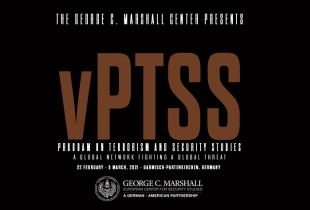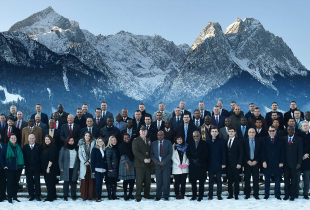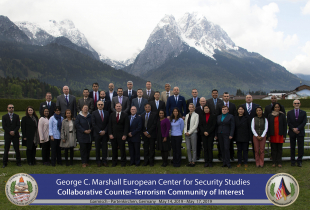
International Senior Officials Gather at George C. Marshall Center to Discuss How ISIS Ends
By James Brooks
Public Affairs Office
George C. Marshall European Center for Security Studies
GARMISCH-PARTENKIRCHEN, Germany (Sept. 19, 2016) – Senior military and government leaders from more than 40 nations gathered at the George C. Marshall European Center, Sept. 12-16, to examine and discuss how the global terrorist threat of the ISIS network ends.
Held annually, the Marshall Center’s Senior Executive Seminar resident course focuses on a critical security issue. This year, the objectives were to provide international participants a greater understanding of how ISIS operates, how it is funded and spreads, its complexity as a network of terrorist organizations and how it should ultimately be destroyed.
“There is no question that ISIS is a truly horrific group, but if there is a silver lining to this global menace, it is that ISIS has galvanized the international community and brought us together against a common threat in a way that has perhaps not been seen since the Cold War,” said Marshall Center Program Director for Black Sea and Eurasia Programs Valbona Zeneli.
Col. Hamido Zongo traveled more than 3600 miles from his African nation of Burkina Faso to attend the Marshall Center’s annual Senior Executive Seminar. He was keenly interested in hearing from other senior leaders about their experiences fighting ISIS and find ways to end the threat. Zongo, who is the current Deputy Region Commander, Armed Forces Language Center in Burkino Faso, is involved with countering Boko Haram and other terrorist groups linked to the ISIS network. These groups are conducting deadly operations in his nation and neighboring Mali.
“Here at the Marshall Center, I met the worldwide membership who came here to give an opinion on defeating ISIS. I think this is the best way to find people of experience to help me help my country. Security involves all aspects of society: civilian, military, policemen and even the local population. So bringing people here from around the world from different parts of society is the best idea. Terrorism is worldwide but so is cooperation and collaboration. What is happening in Europe or in India are all linked together. The view in Africa is when your neighbor’s hut is burning, you water down your hut before it’s burned down. I’m learning a lot about the ISIS network by coming here.”
In addition to hearing from some of the leading terrorism experts on ISIS financing, recruiting, and use of the internet, the 71 executives also heard from a four-star line up of military leaders. Joint Force Command Brunssum Commander Italy General Salvatore Farina, outlined NATO policy describing the assets and efforts NATO is putting together to help find a sustainable solution. U.S. Army Gen. Curtis M. Scaparrotti, Commander of European Command and Supreme Allied Commander, Europe, shared his insights on the capabilities of U.S. European Command (EUCOM) and NATO can bring to the fight against ISIS. U.S. Marine Corps Gen. (Ret.) John R. Allen, co-director, Center for 21st Century Security and Intelligence for the Brookings Institution, gave the closing remarks and shared his thoughts on the need for global cooperation and strategy.
Smaller group discussions were an important part of the Senior Executive Seminar not only to give everyone a better understanding of the problem but to build trust and understanding among international leaders. One theme came into focus quickly: defeating ISIS will take more than military force. U.S. National Guard Brig. Gen. Sherrie Lynn McCandless said her group of executives wrestled with this idea.
“The patience required with defeating ISIS may be the military’s largest expectation mismatch. Of the five lines of effort in the current global counter ISIS coalition, there’s only one that has a military component. The other four is outside military control. But I think we all suffer from the 24/7 news cycle mentality. Much of the military aspects of this fight are filmed and people want to see results. The first piece of the difficulty in defeating ISIS is in the expectation management on what is militarily achievable,” said McCandless.
While the media may be focusing on military actions, seminar discussions also delved into what should be the true target of attack against ISIS. The senior executives reached consensus that the target of attack to defeat ISIS was more broad and complicated. While there was success in defeating other terrorist groups, these victories did not prevent the rise of the ISIS network. Future global security and safety will come through victories in other areas.
“I think we agree with the idea that ISIS is a symptom of a greater problem—not a stand-alone entity. ISIS is the name of the current symptom but there will be other follow-on symptoms with other names. That is part and parcel about the urbanization of the world, rapid population growth, the numbers of uneducated youth who might be listening to a message that is not an accurate depiction of Islam but it certainly is music to their ears. They don’t have an economic future. They don’t have an education. These messages give them something they all crave: to be a part of something bigger than themselves,” said McCandless.
Despite the complexity and scope of the problem, McCandless left the Marshall Center’s Senior Executive Seminar with optimism.
“In our seminar, we had people from Lebanon, very near the ISIS threat area. But we also had people from places like Peru, Columbia. It was quite refreshing to hear first-hand how those participants overcame their fight against terrorist groups like Shining Path and the FARQ. Hearing about their successes helped us understand that despite how complex a problem we are dealing with regarding ISIS, they were able to respond and settle their own terrorist problem,”said McCandless.
McCandless wasn’t alone in her optimism. Afghanistan’s Senior Political and Economic Advisor, Office of National Security Farid Mamundzay also saw hope in defeating ISIS.
“I’m optimistic by nature so what I want to say, it’s not undefeatable…it is defeatable. We have defeated many other insurgent groups around the world including those in Afghanistan. It does require some courage, and resources tied into it. But one day we will conquer the dilemma of ISIS,” said Mamundzay.


